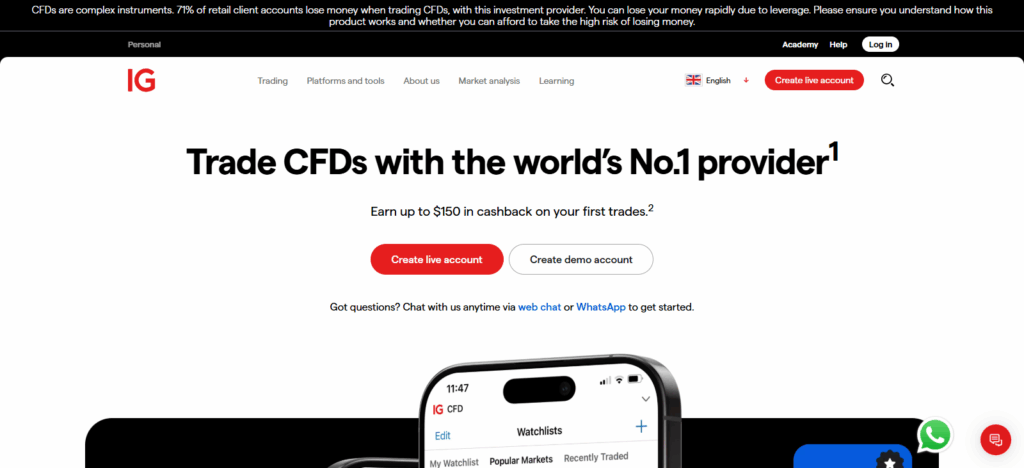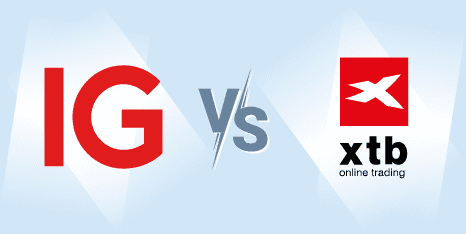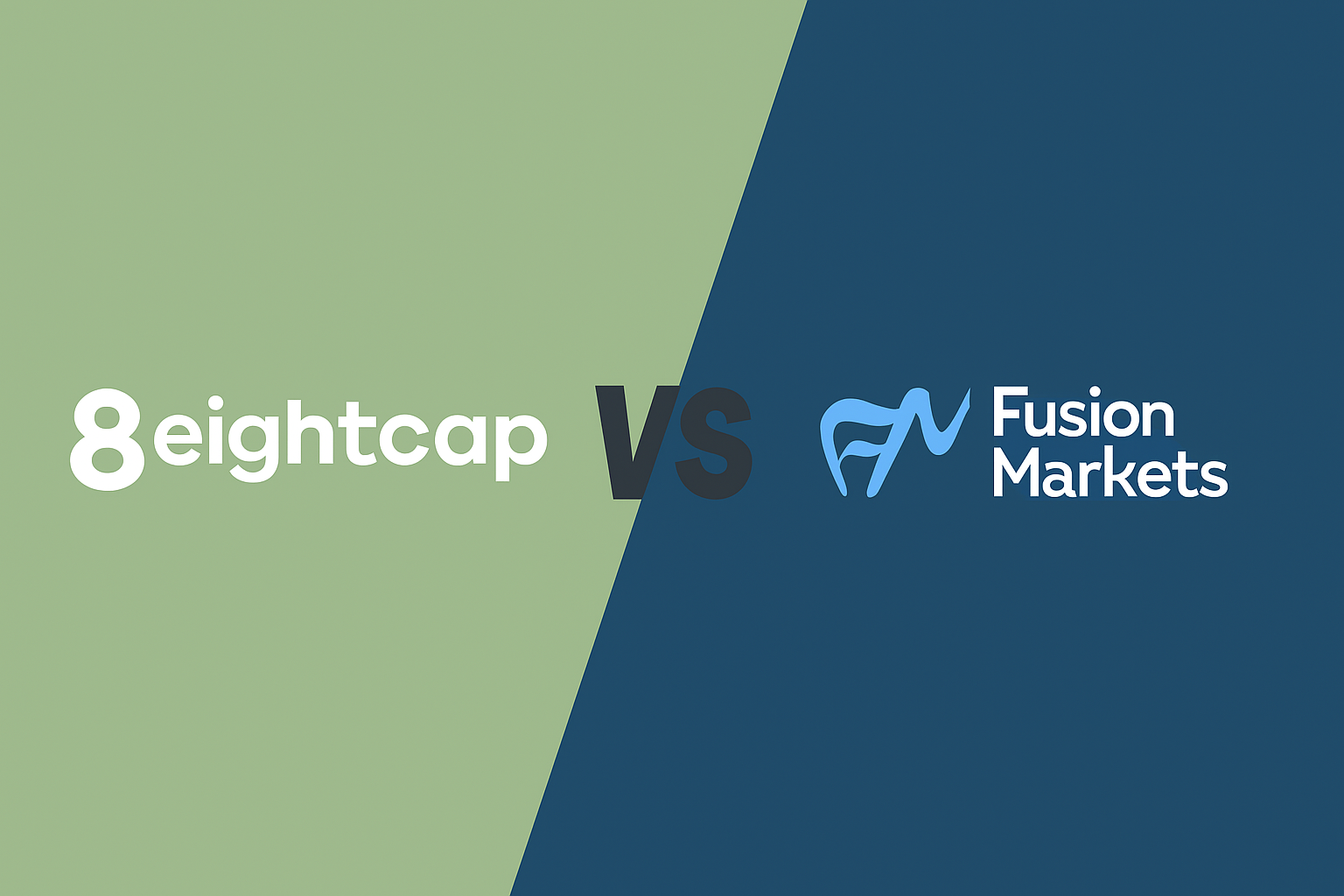This article will review the comparison between IG and XTB regarding their functionalities, trading platforms, pricing, legal oversight, and general effectiveness.
While both brokers are globally recognized, trustworthy, and reliable, they do address different types of traders. This will help you determine which of the two — IG or XTB — best fits your trading objectives.
What is IG?
IG is a worldwide recognized online trading and investment platform established in 1974 and is supervised by major financial bodies such as the FCA (UK), ASIC (Australia), and NFA (United States).

IG provides a range of financial instruments, such as forex, stocks, commodities, indices, cryptocurrencies, and CFDs. IG has developed sophisticated trading terminals, which include MT4, ProRealTime, as well as a proprietary web integrated platform offering services to beginner and advanced traders.
IG is acknowledged for their reliability, clear pricing, and educational materials provided, as well as strong research developed, mobile applicatons for trading, advanced tools for risk management, and transparency which enhances their rating as a broker.
What is XTB?
XTB, one of the most prominent global online brokers, was established in 2002 and is licensed as the FCA (UK), CySEC (Cyprus), and KNF (Poland). Within the financial and crypto markets, XTB serves as an intermediary for forex, commodities, indices, stocks, ETFs, and cryptocurrencies.

XTB is mainly recognized for xStation 5, their powerful patented platform which won multiple accolades within the industry for the speed of execution, user-friendliness, and analytical instruments.
XTB offers no-cost educational materials, insights into the markets, and customer support in multiple languages. Due to their focus on transparency and innovative technology, XTB is highly trusted across the globe, and has no-cost innovative technology for both crypto and traditional instruments.
Key Differences Between IG vs XTB
| Feature | IG | XTB |
|---|---|---|
| Regulation & global footprint | Regulated by multiple Tier-1 authorities globally; long history and broad jurisdiction coverage. | Also well-regulated, but fewer Tier-1 jurisdictions compared to IG. |
| Range of tradable instruments | Very large selection: many forex pairs, CFDs, options, derivatives, etc. | Good selection, but instrument range is generally narrower compared with IG in some categories. |
| Platforms & trading tools | Supports multiple platforms including its proprietary web platform, MT4, others. | Offers its own xStation 5 platform (and MT4 in some cases) with strong usability. |
| Fees, spreads & account minimums | Competitive spreads in standard accounts; account types are broader; minimum deposits tend to be higher in certain regions. | Lower minimums in some markets; spreads/fees competitive particularly for certain account types. |
| Strengths for specific traders | Strong for traders needing wide instrument choice and global regulatory reassurance. | Strong for traders looking for a user-friendly platform and possibly lower barrier to entry (depending on region). |
Which Broker is Better for You?
Choose IG if you:
- Prefer a broker with broader regulation and long-standing reputation – IG has a long history and holds multiple Tier-1 licenses.
- Want access to a very wide range of tradable instruments and derivatives and advanced products across multiple markets.
- Are an experienced trader (or aiming to become one) utilizing advanced tools and IG is best suited to serious/professional traders.
- Appreciate in-depth research, educational resources and other “premium” features that more full-service brokers offer.
Choose XTB if you:
- Are newer to trading and are looking for a more “user-friendly” platform with lower complexity and easier entry.
- Have a smaller budget for trading and prefer lower minimum deposits and a more straightforward account structure.
- Trade primarily stocks, ETFs or other simpler instruments and prefer a more streamlined experience compared to trading very exotic derivatives.
- Want a platform that is intuitive, clean and easy to use over extremely advanced/complex systems.
Regulations and Licenses
| Regulator | IG | XTB |
|---|---|---|
| Australian Securities & Investments Commission (ASIC, Australia) | ✔ — IG is regulated by ASIC among other authorities. | ✘ — XTB’s global entities are regulated by FCA, CySEC, KNF etc; ASIC regulation not clearly listed. |
| Financial Conduct Authority (FCA, UK) | ✔ — IG is regulated by the FCA. | ✔ — XTB Ltd is authorised and regulated by the FCA (UK). |
| Monetary Authority of Singapore (MAS, Singapore) | ✔ — IG lists MAS among its regulators. | ✘ — Not clearly indicated that XTB is regulated by MAS. |
| Commodity Futures Trading Commission (CFTC, USA) / National Futures Association (NFA, USA) | ✔ — IG mentions CFTC/NFA among some of its regulated jurisdictions. | ✘ — XTB is not regulated by CFTC/NFA and cannot offer services in the US. |
| Financial Sector Conduct Authority (FSCA, South Africa) | Not clearly indicated | ✔ — XTB Africa (PTY) Ltd is regulated by FSCA. |
| Swiss Financial Market Supervisory Authority (FINMA, Switzerland) | ✔ — IG lists FINMA among its regulators. | ✘ — No clear evidence that XTB is regulated by FINMA. |
| Cyprus Securities and Exchange Commission (CySEC, Cyprus) | ✘ or not clearly indicated | ✔ — XTB operates under CySEC for EU clients. |
| Financial Markets Authority (FMA, New Zealand) | ✔ — IG lists FMA among its regulators. | ✘ — No clear indication for XTB. |
| Dubai Financial Services Authority (DFSA, Dubai) | ✘ or not clearly indicated | ✔ — XTB MENA Ltd is regulated by DFSA. |
| Federal Financial Supervisory Authority (BaFin, Germany) | ✔ — Some IG regulatory listings include BaFin. | ✔ — XTB S.A. is authorised by BaFin. |
| Bermuda Monetary Authority (BMA, Bermuda) | Not clearly indicated | ✘ — No clear evidence for XTB (or IG) being regulated by BMA in the sources checked. |
XTB vs IG: Features
XTB
- Trading Instruments: XTB offers more than 5,800 instruments to choose from along with real stocks, ETFs, and CFDs for trading forex, indices, and commodities.
- Maximum Leverage: XTB offers maximum leverage ranging from 1:500 depending on the jurisdiction and asset type. For example, under CySEC regulation, the leverage is 1:30.
- Minimum Deposit: XTB has no minimum deposit which allows traders to open an account with any amount.
- Account Types: There are 2 main types which are Stocks & ETFs and the other is CFD Accounts.
- Trading Fees: For CFDs, XTB offers 0.5 pips. Also, when trading stocks, you pay 0% commission.
- PAMM/MAM: Not available.
- Scalping: Allowed.
- News Trading: Allowed.
- EA/Robot Trading: Allowed.
IG
- Trading Instruments: Provides access to more than 17,000 instruments including forex, shares, amount of indices, commodities, cryptocurrencies, bonds and options.
- Maximum Leverage: Maximum leverage under IG is 1:30 to 1:200, depends on the jurisdiction and tradable asset type.
- Minimum Deposit: There is no minimum set amount which is required, except $250 for credit/debit card and PayPal deposits.
- Account Types: The available accounts are Standard, Limited Risk, Spread Betting, Options Trading, Turbo24, Share Dealing, and Professional Accounts.
- PAMM/MAM: Available.
- Scalping: Allowed.
- News Trading: Allowed.
- EA/Robot Trading: Supported.
Better Trading Platform – XTB
XTB and IG both provide multiple trading platforms designed to match different trader needs. Here’s a clear comparison of their platform availability:
| Trading Platform | IG Group | XTB |
|---|---|---|
| MetaTrader 4 (MT4) | ✅ Yes | ✅ Yes |
| MetaTrader 5 (MT5) | ❌ No | ❌ No |
| cTrader | ❌ No | ❌ No |
| TradingView | ✅ Yes | ❌ No |
| Copy Trading | ✅ Yes | ❌ No |
| Proprietary Platform | ✅ Yes | ✅ Yes |
If you’re unsure which platform fits your strategy, we offer a quick trading software questionnaire. Just answer six simple questions, and we’ll recommend the most suitable platform for your trading style.
Deposit & Withdrawal Options
| Category | IG | XTB |
|---|---|---|
| Deposit Methods | Bank transfer, Credit/Debit cards, FPS (HKD), IG Mobile App, Wise | Bank transfers, Credit/Debit cards, E-wallets |
| Withdrawal Methods | Credit/Debit cards, Bank transfer | Bank transfers, Credit/Debit cards, E-wallets |
| Other E-Wallets Supported | None | PayPal, Skrill, Neteller |
Tools & Educational Resources
| Feature | IG | XTB |
|---|---|---|
| Economic Calendar | ✅ Yes | ✅ Yes |
| Tools & Education | Trading analytics tools, Seminars & webinars | Educational articles, Market news/tutorials |
Fees & Commissions
| Fee Type | IG | XTB |
|---|---|---|
| Trading Fees | US shares: 0 commission on 0–50 trades/month, then $5; EU shares: 0.1% | Spreads from 0.1–0.5 pips; Stock transfer fee $25; ETF commission 0.2% |
| Spread Type | Variable | Variable |
| Per Lot Fees | ❌ N/A | 0.08% per lot (0.16% round turn) |
| Options Contracts Fee | ❌ N/A | ❌ N/A |
| Futures Contracts Fee | ❌ N/A | ❌ N/A |
| Guaranteed Stop Loss | Charged per asset | ❌ Not available |
| Maximum Leverage | 200:1 | 500:1 |
Non-Trading Fees
| Fee Type | IG | XTB |
|---|---|---|
| Dormant Account Fee | $12/month after 24 months inactivity | Fee after 12 months inactivity |
| Subscription Fees | ❌ None | ❌ None |
| Advisory Fees | ❌ None | 0% – 0.85% depending on portfolio type |
| Swap Fees (Overnight) | ✅ Yes | ✅ Yes |
| Statement / Document Fee | $50 | ✅ Free |
| Account Opening Fee | ✅ Free | ✅ Free |
| Maintenance Fee | ✅ Free | ✅ Free |
| Deposit Fees | Free for wire & check deposits | Free for cards & bank transfers; 2% with Skrill |
| Currency Conversion Fee | 0.5% (CFDs & shares), 0.7% (intl. shares) | 0.50% |
| Withdrawal Fees | Wire: $25 fee | Free above $50; Small-fee below $50 |
Pros & Cons
Pros & Cons IG
Pros:
- Multiple top-tier authorities (FCA, ASIC) have issued client money regulations to IG (Germany, Australia, United Kingdom).
- Thousands of markets including forex, stocks, and commodities.
- Advanced traders gain access to high-end trading platforms and tools (i.e. MT4, web/mobile versions) to and high-end trading platforms.
- Extensive educational tools and market analysis to help traders.
- Protection of segregated client accounts and the other strong security measures.
Cons:
- More expensive in certain aspects (e.g. higher minimum deposits, share-CFD fees) than the simpler brokers.
- Some customers say that the support is inconsistent or not available and especially during the after-hours for major time-zones.
- Depending on the geo-reg focus, retail clients and accounts features may have limited access.
- Charges or inactivity fees on accounts.
Pros & Cons XTB
Pros:
- Trust and safety is backed by regulation from major authorities (FCA, CySEC).
- Beginners and intermediates find the usability of the proprietary platform (xStation 5) to be intuitive.
- InvestingBrokers.com states that there are a large number of Instruments, competitive spreads, and a large number of markets available.
- In some areas, there is no or low minimum deposit, and there might be promotional offers (depending on the region).
- Comprehensive educational materials and resources available for traders.
Cons:
- The popular MetaTrader 4 or MetaTrader 5 platforms, which some experienced traders prefer, is not available.
- Inactive accounts and accounts with low withdrawal amounts may have fees in some regions.
- Certain asset classes may have limitations (e.g. actual ownership vs CFDs) and, in many cases, US clients are not accepted.
- The emphasis on CFDs may be a disadvantage for long-term investors who prefer to “buy & hold” real underlying assets.
Customer Support Ig Vs XTB
IG Customer Support
IG has almost 24/7 customer support, accessible from 8 a.m. Saturday to 10 p.m. Friday (UK time) through live chat, phone, and an online contact form. In my experience, live chat was the slowest option, taking around 15 minutes to connect and get an answer. Phone support was considerably quicker, answering in under 5 minutes. The agent was knowledgeable and walked me through the process effectively.
XTB Customer Support
XTB has 24-hour customer support from Monday to Friday in different languages through live chat, phone, and email. In my test, the support team showed an impressive understanding of trading and was able to deal with my questions. The fastest response time was through the phone, and in comparison, the live chat had a longer wait time. However, the chat was still responsive and the answers were helpful.
Conclusion
Both IG and XTB are reputable, well-regulated brokers, providing excellent trading platforms and market access. IG wins with the number of instruments, reputation, and with professional-grade trading tools.
XTB has the xStation 5 interface, the least entry requirements and the best customer services, which we are sure casual traders will appreciate. In the end, choose IG for its depth, global range, and sophisticated analysis tools. Pick XTB for its simplicity and competitive pricing.
FAQ
Is IG regulated and safe to trade with?
Yes — IG is regulated by several major financial authorities and has a long history dating back to 1974. This helps provide a level of trust and security.
However, regulation varies by region and product, so you should still check whether your local jurisdiction is covered and what protections apply.
Which broker is better suited for beginners?
Generally, XTB is considered more beginner-friendly because of its simpler account options and user-friendly platform. IG, on the other hand, offers more advanced tools and features which can be great for experienced traders, but may overwhelm a complete beginner.
Which broker is better for advanced traders?
IG tends to have the edge for advanced traders due to its broad range of instruments, advanced platform options (e.g., MT4, ProRealTime) and global reach. XTB is still strong, but its simpler structure may not satisfy all advanced-trader demands.









